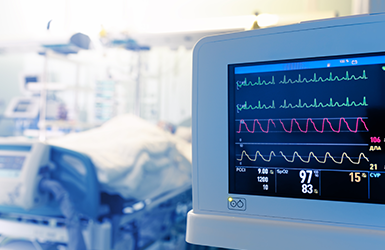Intensive Care Unit (ICU)

The Intensive Care Unit (ICU) is a specialty-care division that operates 24 hours a day, 365 days a year. The ICU is designed to provide a concentration of skills, equipment, and facilities for specialized medical and nursing care for critically ill patients and patients in unstable condition. Just as its name indicates, an ICU is a special ward found in most hospitals to provide intensive care (treatment and monitoring) following surgery, after an accident, or during severe illness. ICU patients need constant medical supervision and support to keep their bodies functioning. They may not be able to breathe on their own and may have multiple organ failure. Medical equipment sometimes performs the necessary functions for survival while the person recovers.
The Intensive Care team is a multidisciplinary group who, while maintaining high standards of patient care, is responsible for:
-
- Treating our patients, their families, and friends with dignity, fairness, compassion, and respect
- Respecting the right of all patients to make informed decisions regarding care, treatment, and their participation in education
- Maintaining a commitment to the development, support, and recognition of our staff
- Collaborating with all care providers
- Respecting our cultural diversity within the community
The mission of the Intensive Care Unit is to provide outstanding patient care to improve the health of critically ill patients, while being responsive to the individual needs of patients and health care providers.
Our care is guided by the needs of the patient. We treat every person with dignity and courtesy, and act with concern for the well-being of every person.
Clinical Services ICU’s are highly regulated departments, typically limiting the number of visitors to the patient’s immediate family even during visiting hours. ICU patients often have several monitors attached to various parts of their bodies for real-time evaluation of medical stability. They benefit from specialized monitoring equipment, a high degree of medical expertise, and constant access to highly trained nurses. ICU care thus requires a multidisciplinary team that consists of Intensivists (clinicians who specialize in critical illness care); pharmacists and nurses; respiratory care therapists; and other medical consultants from a broad range of specialties including surgery.
-
- Periodic assessments: The Intensivist will make periodic assessments of the patient’s cardiac status, breathing rate, urinary output, and blood levels for nutritional and hormonal problems that may arise and require urgent attention or treatment.
- Post-surgery monitoring: Patients who are admitted to the ICU for observation after surgery may have special requirements for monitoring. These patients may have catheters placed to detect hemodynamic (blood pressure) changes, or require endotracheal intubation to help their breathing, with the breathing tube connected to a mechanical ventilator.
- Care coordination: In addition to the Intensivist’s role in direct patient care, he or she is usually the lead physician when multiple consultants are involved in an intensive care program. The Intensivist coordinates the care provided by the consultants, which allows for an integrated treatment approach to the patient.
- Nursing care: Nursing care has an important role in an intensive care unit. The nurse’s role usually includes clinical assessment, diagnosis, and an individualized plan of expected treatment outcomes for each patient (implementation of treatment and patient evaluation of results).
- Drug therapy evaluation and tube feeding: The ICU pharmacist evaluates all drug therapy, including dosage, route of administration, and monitoring for signs of allergic reactions. In addition to checking and supervising all levels of medication administration, the ICU physician and pharmacist are responsible for enteral and parenteral nutrition (tube feeding) for patients who cannot eat on their own.
- Respiratory care: ICUs also have respiratory care therapists with specialized training in cardiorespiratory (heart and lung) care for critically ill patients. Respiratory therapists generally provide medications to help patients breathe as well as the care and support of mechanical ventilators. Respiratory therapists also evaluate all respiratory therapy procedures to maximize efficiency and cost-effectiveness.






